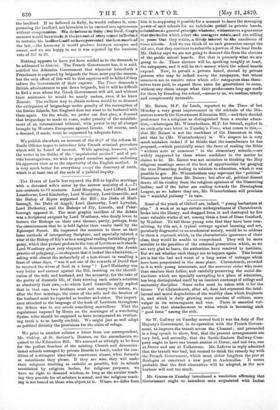We print in another column a letter from our correspondent,
Mr. Oakley, of St. Saviour's, Horton, on the amendments re- quired to the Education Bill. We contend as strongly as he does for -the perfect freedom of the existing Church and denomina- tional schools managed by private Boards to teach, under the con- dition of a stringent time-table conscience clause, what fortnulm or catechisms they please. If they are wise, they will make their religious teaching as catholic as possible, but in schools established by religious bodies, for religious purposes, we have no right to demand wisdom, so long as the secular teach- ing they provide for all scholars is sound, and the religious teach- ing is notioreed on those who objeetto it. Where we differ from him is in-supposing it possible for a moment toleave the managing power of such schools for an indefinite peridd in private hands, electeilonoo general principle wimilerer, withouteeveu a guarantee thattlie.bodies which select'sthe managers retainesnd are willing to prove that they retaini.ailivaly erest in the excellence of 'these schools. And we can think of no such guarantee except the old one, that they continue to subscribe a portion of the local funds. Mr. Oakley says we are not going to demand this from the electors of the public 'school boards. But that is precisely-what we are going to do. Those electors will be, speaking roughly at least, the ratepayers, and it will be their money which the school boards expend. Now, to permit a private board, elected by private persons who 'may be indeed among the ratepayers, but -whose nominees are to receive rates which other ratepayers than them- selves have paid, to expend those rates for generations to come, without any claim except what their predecessors long ago made for them by founding the school, —seems to us, we confess, utterly and conspicuously untenable.






























 Previous page
Previous page